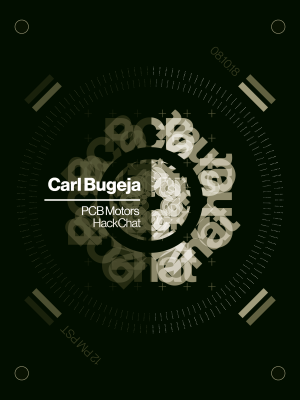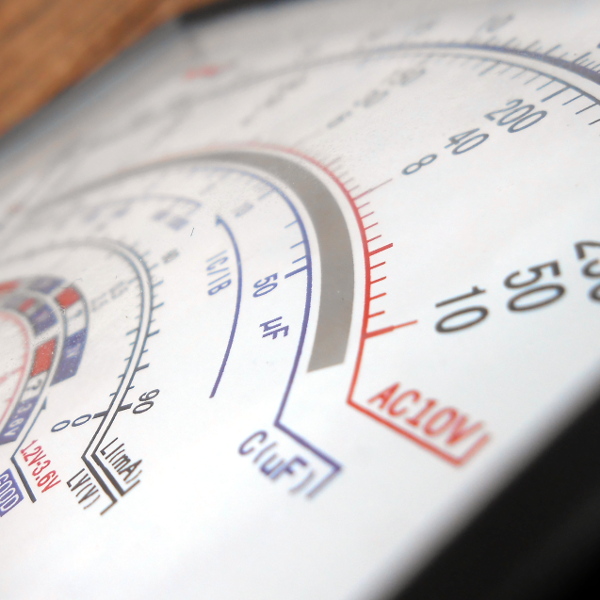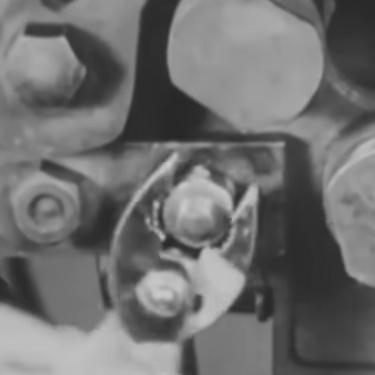One of the most amazing technological advances found in this year’s Hackaday Prize is the careful application of copper traces turned into coils. We’ve seen this before for RFID tags and scanners, but we’ve never seen anything like what Carl is doing. He’s building brushless motors on PCBs.
All you need to build a brushless motor is a rotor loaded up with super powerful and very cheap magnets, and a few coils of wire. Now that PCBs are so cheap, the coils of wire are easily taken care of. A 3D printer and some eBay magnets finish off the rest. For this week’s Hack Chat, we’re talking with Carl about PCB motors.
 Carl Bugeja is a 23-year old electronics engineer who is trying to design new robotics technology. His PCB Motor design won the Open Hardware Design Challenge and will be going to the Finals of the Hackaday Prize. This open-source PCB motor is a smaller, cheaper, and easier to assemble micro-brushless motor.
Carl Bugeja is a 23-year old electronics engineer who is trying to design new robotics technology. His PCB Motor design won the Open Hardware Design Challenge and will be going to the Finals of the Hackaday Prize. This open-source PCB motor is a smaller, cheaper, and easier to assemble micro-brushless motor.
[Carl]’s main project, the PCB Motor is a stator that is printed on a 4-layer PCB board. The six stator poles are spiral traces wound in a star configuration. Although these coils produce less torque compared to an iron core stator, the motor is still suitable for high-speed applications. [Carl]’s been working on other PCB motor designs, like the Linear PCB motor which is a monorail on a PCB and the Flexible PCB actuator where the coils of wire are tucked inside Kapton.
During this Hack Chat, we’re going to be discussing:
- The design and construction of brushless motors
- How to drive these motors
- PCB applications beyond standard circuitry
- Building accessible robotics technology
You are, of course, encouraged to add your own questions to the discussion. You can do that by leaving a comment on the Hack Chat Event Page and we’ll put that in the queue for the Hack Chat discussion.
Our Hack Chats are live community events on the Hackaday.io Hack Chat group messaging. This week is just like any other, and we’ll be gathering ’round our video terminals at noon, Pacific, on Friday, August 10th. Need a countdown timer? You wouldn’t if we switched to universal metric time.
Click that speech bubble to the right, and you’ll be taken directly to the Hack Chat group on Hackaday.io.
You don’t have to wait until Friday; join whenever you want and you can see what the community is talking about.

















2006
http://www.otherpower.com/images/scimages/15/Printed_stator.JPG
also the planar pcb transformers are very interesting too in this smaller and smaller tech world, even so if you apply the resonant circuit theory, you not even need a core, hence the working frequency can go up and the size down, it can be very practical for led lighting for example and also it’s very cheap to construct
indeed… but it isn’t so that the working frequency can go up… it MUST go up in order to get to something practical. Although components are getting better and better as we speak, higher switching frequencies can result in higher losses. But as components are getting better and better we are more and more allowed to reduce coil sizes. To the point where we can make then on a PCB without doing to much concessions on performance. What a great time and age we live in.
If the magnetic core materials technology also keeps evolving in the same way perhaps someday a switching regulator could be made using integrated circuit technology meaning that the inductor would be ON the chip instead of next to it. I imagine that the case of such a chip would be a combination of plastic and core material. Wouldn’t that be awesome?
Linear µModules ? Those are complete DC/DC Converters in BGA Packages (Mosfets and Inductor included in).
I saw them used way before that, I believe in 3.5in floppy drives, but you have a date. Better than I can do.
It’s not mine, just random board from many, to support grumpy statement that it’s nothing new.
Yeah, I did this in 2005 to not only rotate a sensor atop the PCB, but also to transfer power and signals through the rotating non-contact interface. Sadly, it did not make it into production. It was for the Neato vacuum (they were then called Home Robots, and were in Mountain View, CA just down the block from the Computer History Museum). They also did not patent it. Was definitely an odd company back then… Still: think it’s important to encourage young engineers like this guy to continue to be inventive and clever! Nice work.
Oh, they’re far older than that. I was servicing medical equipment in the late 80s that used servodisc “pancake” motors, and they were old even then. Astonishing acceleration out of the things, but low power density.
I think it was in a 5.25″ floppy drive. I was having the same rememberence. I liked that brand as they had a big ceramic magnet that went over all the coils. Back in the day I was making wireless security cameras that were rechargeable and on some of them I used those magnets as the base. It worked great. You could stick them to a kitchen appliance or stick them to your car.
Thank you. You triggered a memory that has a somewhat reliable associated date. I used one of those to mount my K40 CB antenna, so that puts it somewhere around 1992. It seems pretty unlikely I would be tearing down a 3.5in drive at that point, so it was probably a 5.25.
If I had to guess it was probably a Teac drive.
I do recall thinking to myself “how is this giant steel backed ceramic magnet not erasing my disks” as I used it.
Yes. they were much better at sticking to a car than the commercially available magnets of the day. Speaker magnets were pretty good too, but much taller.
I should probably not be nit-picking the article wording though.
Yes, like my project, this has been done before. But also, like my project, this time it is open source.
google archaeology says it was not quite pcb coils:
https://martinjonestechnology.files.wordpress.com/2014/04/img_6340.jpg
Ah, well.. that’s pretty close to the magnet I remember. That was probably it. Didn’t have much use for the rest of it.
What I’d like to find is a decent (free, easy to use) calculator that can predict optimal wire patterns for a given magnet configuration.
The AFPMAS-1 photo above is obviously nonoptimal: much void space, thin conductors. Specialized modeling software exists, but it’s expensive and the learning curve is steep. A few Matlab toolboxes, ANSYS and COMSOL can handle it. Solidworks even has a module for it. Searching for “free magnetic motor simulation” leads (predictably) down the Rabbithole of Woo.
Are there any free/foss/cheap, reasonably sophisticated motor simulators out there?
It’s more magnetostatics but can analyze some motors:
Finite Element Method Magnetics:
http://www.femm.info/wiki/HomePage
The flip side of this id you can also use this to make alternators. And you can sandwich more than one board thickness together.